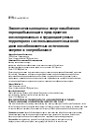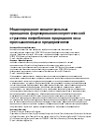Main Directions for Improving the State and Municipal Proper ty Management System
DOI: 10.33917/es-1.199.2025.88-95
The state and municipal property management system is a set of agreed methods and means of targeted influence on the subjects of management process in order to achieve specified goals. The principle of maximizing the income received cannot be used as the basis for assessing the management of state and municipal proper ty objects due to the public nature of this category. In addition to the general principles of managing state and municipal proper ty inherent in the existing mixed economy, it is also necessary to take into account specific ones that meet the requirements of the transition period.
These include: compliance of the content and methods of management with the nature of reforms and, first and foremost, with ensuring progressive institutional shifts in the economy; focus of management on overcoming the systemic crisis of the economy and implementing its restructuring; compliance of organizational elements of management with the tasks of implementing industrial, investment, innovation and other policy areas.
References:
1. Rozhkov E.V. Ispol’zovanie zemli v granitsakh munitsipal’nogo obrazovaniya kak polozhitel’nyy opyt upravleniya krupnym gorodom [Use of Land within the Boundaries of a Municipality as a Positive Experience in Managing a Large City]. Vestnik soveta molodykh uchenykh i spetsialistov Chelyabinskoy oblasti, 2022, vol. 1, no 1(36), pp. 69–75.
2. Bagaeva L.E., Kondratenko Z.K. Stanovlenie i reformirovanie zakonodatel’stva o privatizatsii munitsipal’nogo imushchestva [Formation and Reform of Legislation on the Privatization of Municipal Property]. Vestnik Mariyskogo gosudarstvennogo universiteta. Seriya: Istoricheskie nauki. Yuridicheskie nauki, 2019, vol. 5, no 2, pp. 166–172, DOI: 10.30914/2411-3522-20195-2-166-172.
3. Akhmatova A.M., Lushinkova T.Yu. Bol’shaya privatizatsiya: tseli, zadachi, osobennosti realizatsii v rossiyskoy ekonomike [Large-scale Privatization: Goals, Objectives, Implementation Features in the Russian Economy]. Obshchestvo, ekonomika, upravlenie, 2018, vol. 3, no 1, pp. 10–16.
4. Mal’ginov G.N., Radygin A.D. Pervye itogi privatizatsionnoy programmy 2017–2019 gg. i osnovnye voprosy upravleniya gosudarstvennym imushchestvom [The First Results of the Privatization Program 2017–2019 and the Main Issues of State Property Management]. Ekonomicheskoe razvitie Rossii, 2018, vol. 25, no 6, Iyun’ — iyul’, pp. 42–55.
5. Grigor’ev L.M., Kurdin A.A. Nereshennyy vopros legitimnosti chastnoy sobstvennosti v Rossii [The Unresolved Question of the Legitimacy of Private Property in Russia]. Voprosy ekonomiki, 2016, no 1, pp. 36–62.
6. Gengut Yu.L. Metodologiya statisticheskogo issledovaniya protsessov privatizatsii gosudarstvennogo i munitsipal’nogo imushchestva na territorii Rossiyskoy Federatsii [Methodology of Statistical Research of Privatization Processes of State and Municipal Property on the Territory of the Russian Federation]. Regional’noe razvitie: elektronnyy nauchno-prakticheskiy zhurnal, 2014, no 2, pp. 112–119.









